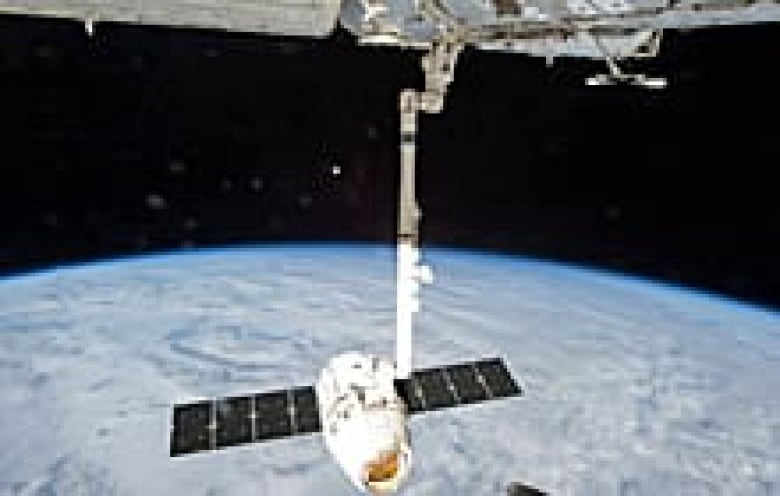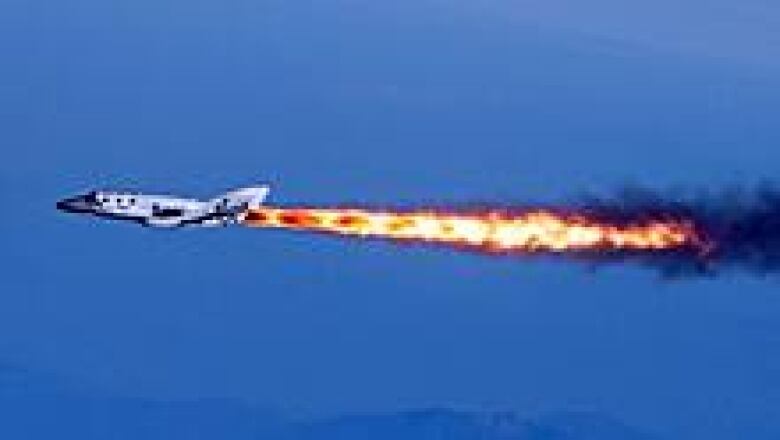How soon before another Canadian follows Hadfield into space?
While Chris Hadfield's stellar success in space may be inspiring other Canadians to dream of getting into orbit, opportunities seem few and far betweenunless astronauts are willing to be very patient or space tourists are very rich.
Rookie astronaut Jeremy Hansen knows there's no date set for himor any other Canadianto follow Hadfield into space any time soon.
- Read how Chris Hadfield turned Canadians on to space
- Watch the Chris Hadfield press conference LIVE on CBCNews.ca at 10 a.m. ET
But Hansen, a 37-year-old former fighter pilot and, like Hadfield, another southern Ontario farmboy-turned-astronaut,is undaunted bythe talk of uncertainty around the future of Canada in space or the Canadian Space Agency.
"People use that term 'uncertainty' and I guess it's accurate in one context, that we don't know timelines. But there's not any uncertainty in my mind that we're going to continue as an agency," Hansen said in an interview from NASA's Johnson Space Centre in Houston.
"We're committed to the space station until 2020 and talking about going beyond 2020 with the space station, and we've made some significant investments in some new technologies like Canadarm 3."
The CSA has said there probably won't be another Canadian on the ISS before 2016.
But Hansen says the CSA has also told him and fellow rookie astronautDavid Saint-Jacquesthat the goal is to fly them both in the current decade.
"That's pretty motivating for me. That's a pretty amazing opportunity."
No more shuttles
With the demise of NASA's space shuttle program, any government-sponsored opportunity for a North American to get into orbit right now depends on being strapped into a Russian Soyuz rocket. No Canadians are slotted on any scheduled flights.
But NASA isalso overseeinga crew-development program by the private sector, which sees three U.S. companies working on rockets and spacecraft that could carry astronauts to the ISS a few years down the road.
"That, to me, speaks of a lot of potential," says Hansen. "Things can change very rapidly."
He sees the possibility that he could one day ride in a commercial vehicle developed by the likes of SpaceX, a company that hasalready sent an unmanned Dragon capsule on three return trips to the ISS.

"These commercial companies have been given seed money basically to develop these rockets, and so that's really going to change the opportunities for Canada," Hansen says. "And then there'll be seats available still on the Russian Soyuz and new seats available on this new commercial vehicle, so it's hard to say what opportunities Canada will have."
Today, of course, space opportunities are no longer limited to government-sponsored endeavours.
Commercial space tourism ventures such as Virgin Galactic and Space Expedition Corp. aremaking plans topropel customers willing to pay a lot of money into zero G, even if only for a few minutes.
A private company, Space Adventures, has taken seven people, who paid between $20 million and $40 million each, to the ISS.
Canada's first space tourist,Cirque du Soleil founderGuy Lalibert, paid a reported $35 million for a12-day stayon the ISS in 2009.
And, in a slightly different vein,at least 35 Canadians have appliedto make a one-way trip to Mars in 2023 to live out the rest of their lives there as space colonists.
Buy your own ticket
For some observers, however, the prospects of Canadians getting into space any time soon are pretty dimunless someone is willing to foot the bill.
"Right now, the best chance that anybody has is to buy their own ticket," says Marc Fricker, vice-president of the Canadian Space Society and an aerospace engineer with the Canadian Forces who was seconded at one point to the CSA to help teach astronauts how to operate the Canadarm.
"Unfortunately, even the astronauts, the brand new ones that we just hired a couple of years ago, they're probably better off buying their own ticket than waiting for governments to launch them."

Fricker considers that the federal government has "no interest" in going into space, and is poised to allow any launch capability it has to die. But he does seepotential in other areas.
"Perhaps things like the space tourism and another avenue of space mining might turn that around. There's lots of people in the country that are saying that Canada has a great deal of mining expertise that should be brought to bear to the asteroids and the other orbital bodies in order to get the minerals out there."
Canadians who have already been in space are more optimistic others will follow in their footsteps.
"We will see the other Canadians fly. There's no question," says Bjarni Tryggvason, one of Canada's original team ofsix astronauts.
"The manned program has absolutely not gone away. It's just changing a little bit with the shutdown of the shuttle program in the States."
Falling behind
Hadfield's triumphant return from the ISS this week is a big bright light in the otherwise uncertain future surrounding the CSA and space exploration by Canadians.
A review, commissioned by the federal government, found late last year that Canada's space industry has been lacking direction and falling behind other countries for the past decade.
Industry Minister Christian Paradis did not respond to a request for an interview, but the government has said it is reviewing the report by David Emerson, a former federal cabinet minister.
Mark Garneau, Canada's first astronaut and a former CSA head who is now a Liberal MP, says the priority the government has placed on the space program has been "very disappointing."
"They've cut 10 per cent from the budget, which is, in my opinion, a mistake because it means the Canadian Space Agency, which already has only a very modest budget, will have to cut back and also let some key people go."
Garneau considers that decision shortsighted. Even if the government were to re-establish the cut funding in a year or two,"things don't jump back to normal, because you've lost key people and programs in the interim and you have to climb that hill again."
What the U.S. wants
Uncertainty about the future of humans in space is not restricted to Canada.
Gordon Osinski, deputy director of the Centre for Planetary Science and Exploration at Western University in London, Ont., says there is a lot of discussion right now internationally about "where we are going next with humans.
"A lot of it is driven by what the U.S. says, and a little while ago it was the moon," Orsinski says. "Then Obama came in and it was asteroids and now there seems to be actually quite a lot of emphasis being placed on not necessarily landing back on the surface of the moon but potentially missions at least to and around the moon.
"Jeremy and David are very much lined up for those types of missions."
Beyond spaceflight, Hansen also sees significance in other work underway that will reap rewards when astronauts do fly beyond low-Earth orbit.
"I see a lot of really cool technologies being developed by people with foresight, people that seem to say, 'Look, we don't have the big mission on the books right now, but we are going to need these pieces.'
"I can see that when we finally make the decision to go beyond low-Earth orbit, we're going to have a lot of these pieces already figured out."
With files from The Canadian Press













_(720p).jpg)


 OFFICIAL HD MUSIC VIDEO.jpg)
.jpg)



























































































